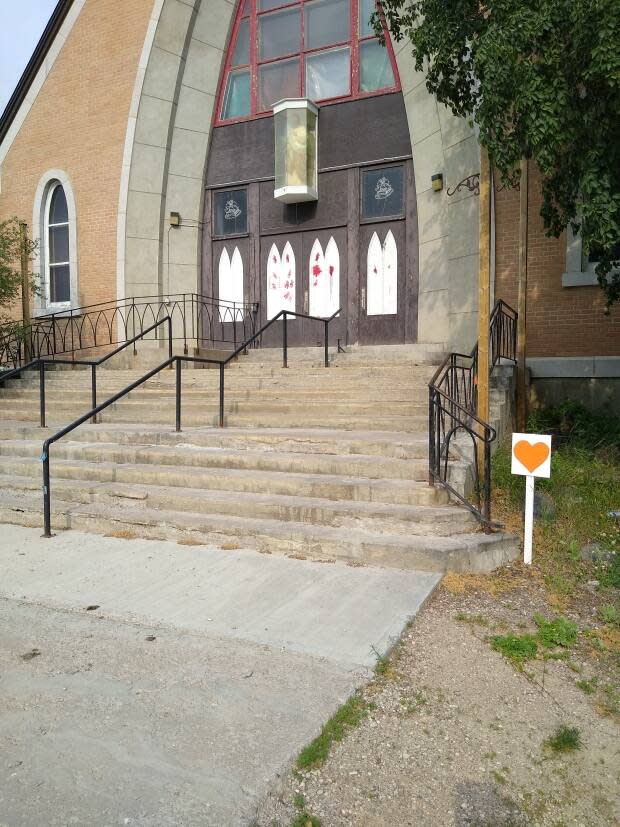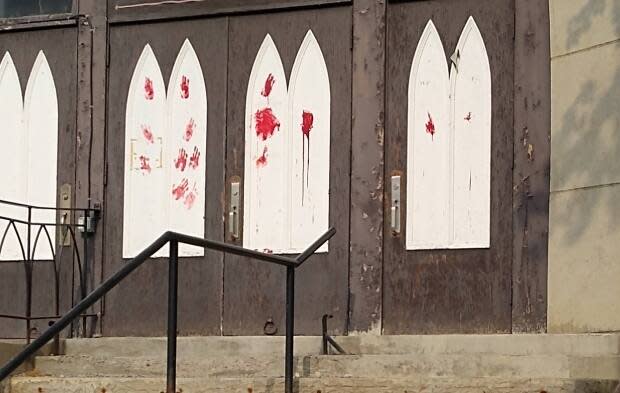Catholic church in Fort Smith, N.W.T., marked with red hand prints

Red hand prints have appeared on the front doors of the Catholic church in Fort Smith, N.W.T., but the parish's priest said someone has already come forward and apologized for the markings.
Cornelius Ngurukwem, the reverend at St. Joseph's Cathedral, told CBC News he was out cutting the grass on Friday when he first noticed the prints.
"I was confused, I didn't know who did such a thing," he said.
There has been a wave of vandalism and arson attacks targeting Catholic churches across Canada, following the discoveries of what are believed to be unmarked graves belonging to children near former residential schools in the country. Statues of religious leaders and figures with ties to Canada's colonial past have also been painted red or torn down.
The vandalism at the cathedral comes just a few days after what police are calling a suspicious fire at St. Patrick Co-Cathedral catholic church in Yellowknife.
By Saturday morning, however, someone had already taken responsibility for it, said Ngurukwem.

"Someone walked up to me and owned it up and he said he felt so remorseful about the whole thing and promised that he's going to clean it up as fast as possible," he said.
Ngurukwem didn't ask the individual why he put red hand prints on the doors in the first place, but believes it may have been out of emotion, he said.
"I really had to advise him and give him some spiritual food and also pray for him and really, he felt so remorseful," he said. "I was a little bit happy that someone came to own it up."
Louise Beaulieu, a town councillor in Fort Smith who is Métis, understands the anger people are feeling toward the Catholic church — but fire and vandalism are not the answer, she said.
Indigenous people have to learn how to deal with that history in a way that isn't violent and fuelled by anger, "because it is not solving anything," she said.
"It is bringing more anger into people's lives."
Beaulieu's father and some other relatives help building the St. Joseph's Cathedral, she added.
"It was built by Aboriginal people and that's the part of the history that I see in our community — who built the church and what is it, what it's used for today, rather than what went on with the residential hostels and the school."
Support is available for anyone affected by the effects of residential schools, and those who are triggered by the latest reports.
The Indian Residential School Survivors Society (IRSSS) can be contacted toll-free at 1-800-721-0066.
A national Indian Residential School Crisis Line has been set up to provide support for former students and those affected. People can access emotional and crisis referral services by calling the 24-hour national crisis line: 1-866-925-4419.
The NWT Help Line offers free support to residents of the Northwest Territories, 24 hours a day, seven days a week. It is 100 per cent free and confidential. The NWT Help Line also has an option for follow-up calls. Residents can call the help line at 1-800-661-0844.
In Nunavut, the Kamatsiaqtut Help Line is open 24 hours a day at 1-800-265-3333. People are invited to call for any reason.
In Yukon, mental health services are available to those in both Whitehorse and in rural Yukon communities through Mental Wellness and Substance Use Services. Yukoners can schedule Rapid Access Counselling supports in Whitehorse and all MWSU community hubs by calling 1-867-456-3838.

